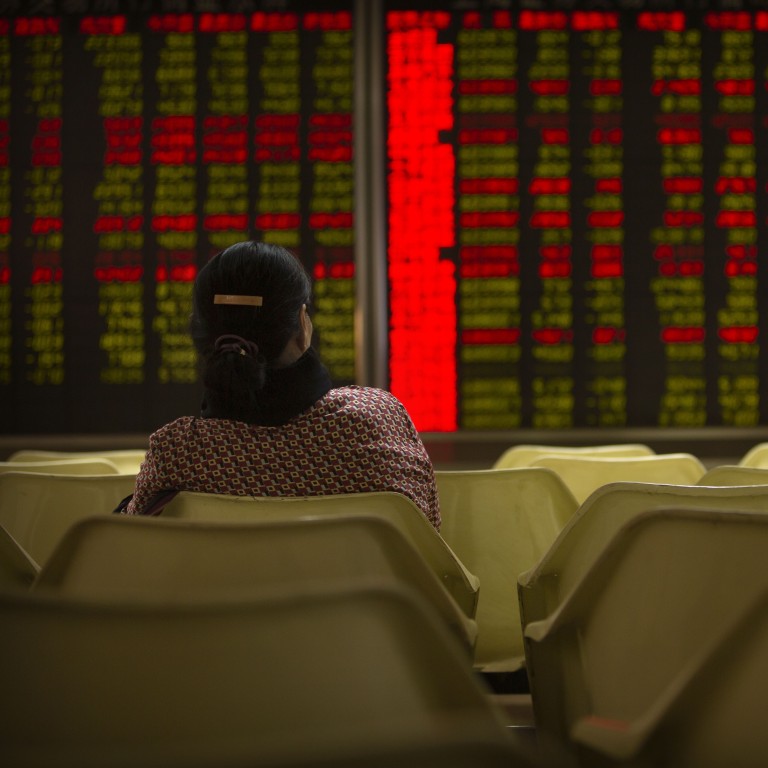
Hong Kong’s Hang Seng extends losing streak to second day amid uncertainty over trade war, end to protests
- MTR closes with small gains, but has fallen about 20 per cent in six weeks
- Hang Seng would enter bear market if it drops another 5.5 per cent
Hong Kong’s Hang Seng Index had another weak day, with investors selling off consumer staples and state-owned financial companies as uncertainty lingered over trade talks and Beijing sent a fresh warning about the city’s ongoing protests.
The Hang Seng Index on Tuesday closed 0.4 per cent lower at 25,527.9, marking its second straight session of losses.
The biggest losers included Geely Automobile, which closed lower by 3 per cent lower at HK$11.7. Mengniu Dairy closed 2.1 per cent lower at HK$30.6. China Construction Bank, Bank of Communications and Bank of China all lost more than 1 per cent.
Li & Fung tumbled by 4.5 per cent to 85 HK cents, touching its lowest level in 14 years. That puts it down 30.9 per cent in 2019.
MTR – the owner and operator of the city’s subway system – ended a three-day losing streak as investors looked for bargains among Hong Kong’s battered stocks. The stock closed 0.8 per cent higher at HK$44.4.
“MTR is cheap now, given its sharp correction,” said Kenny Wen, wealth management strategist at Everbright Sun Hung Kai.
“Frankly, it has stable income from Hong Kong transport operations. And in the coming two to three years, there will be billions of USD of revenue from property development that can be booked into account.
“However, as investors continue to be concerned about the Hong Kong economy and political issues, MTR’s stock price will remain volatile,” he said.
Meanwhile, Cathay Pacific shed 0.2 per cent to close at HK$10.2, as HKET reported new CEO Augustus Tang Kin-wing said in an internal letter that income in August had been hit hard.
Tang said the booking of tickets had been weaker than previous “shoulder” seasons between peak and off peak, and the airline would take steps to balance its capacity, return rate and flight carrying rate, HKET reported.
Wen said Cathay’s stock was weighed down by the CEO’s internal comments.
“I believe the worst is over (for Cathay). But just like MTR, it is one of the victims of Hong Kong political unrest,” he said.
Wen also said that the Hang Seng Index may break through 25,000 or even 24,000 in coming months, as analysts may start to trim down their earnings forecasts.
The Hang Seng’s recent high was 30,157.49 on April 9. It would enter a bear market if it drops to 24,125.992, which would be a 20 per cent drop from then.
After Tuesday’s close, it would need to lose another 5.5 per cent to get there.
Alan Li, portfolio manager at Atta Capital, said investors should look at pharmaceuticals and real estate management. Education stocks “give a good bottom fishing opportunity.”
“MTR is attractive for long-term investors, but the share price is being driven by sentiment in the short term as it is still in the centre of recent conflicts,” he said.
“Cathay Pacific is being blamed by both sides and sees no sign of a turnaround in September. It’s not a good entry time,” he said.
“The trade war and (interest) rate policy are still the main drivers of the market,” he said.
On the mainland, stock benchmarks closed higher, supported by strong performance in telecommunications, electronics and nuclear energy.
The Shanghai Composite Index added 0.2 per cent to close at 2,930.2. The Shenzhen Component Index edged up by 0.7 per cent to close at 9,633.7. And the ChiNext Index rose 0.5 per cent to 1660.4.


